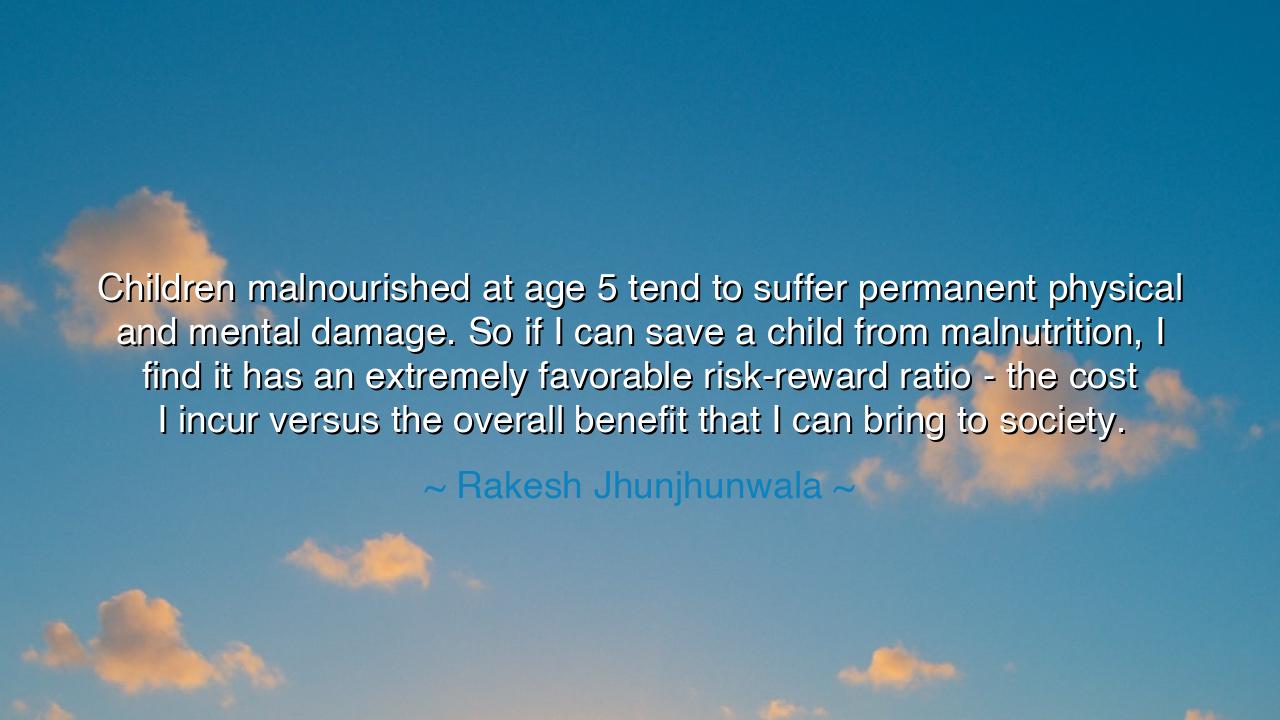
Children malnourished at age 5 tend to suffer permanent physical
Children malnourished at age 5 tend to suffer permanent physical and mental damage. So if I can save a child from malnutrition, I find it has an extremely favorable risk-reward ratio - the cost I incur versus the overall benefit that I can bring to society.






The words of Rakesh Jhunjhunwala—“Children malnourished at age 5 tend to suffer permanent physical and mental damage. So if I can save a child from malnutrition, I find it has an extremely favorable risk-reward ratio—the cost I incur versus the overall benefit that I can bring to society.”—resound with both reason and compassion, a fusion of heart and intellect that few achieve. Behind these words lies a truth as old as civilization itself: that the nourishment of the child is the nourishment of the future, and that the measure of a society’s wisdom is not in its monuments or wealth, but in how it safeguards its weakest members. Jhunjhunwala, known to many as a titan of finance, speaks here not as an investor of capital, but as a custodian of destiny, understanding that the greatest return one can ever earn is the flourishing of another human life.
In his quote, Jhunjhunwala weaves the language of economics into the moral fabric of humanity. He speaks of a “risk-reward ratio,” a term born from markets, yet transfigured here into a tool of ethics. The risk—his own cost, his personal investment—is small compared to the reward—the upliftment of a life, the ripple of wellbeing that touches generations to come. For when a child is freed from malnutrition, it is not only the body that is saved, but the mind, the potential, the future creator of value for the world. Thus, his insight is both pragmatic and profound: to invest in the nourishment of children is to invest in civilization itself.
Throughout history, the wisest leaders have known that the foundation of power and prosperity lies in the care of the young. In ancient Egypt, Pharaohs who sought lasting glory built not only pyramids, but granaries, ensuring that no child starved in famine. In China, during the Han dynasty, emperors established public grain reserves to sustain the people through hard years, knowing that the strength of the empire rested upon the strength of its children. And in our own time, Jhunjhunwala, the “Big Bull” of India, applied his understanding of markets to humanity itself—seeing in the health of children the truest and most enduring form of wealth. His reasoning may sound practical, but beneath it lies the fire of moral vision: that wealth unused for the betterment of others is wealth unrealized.
Let us pause to see the depth of what he says about malnutrition. To the ancient philosophers, the body and mind were twin instruments of the soul. When a child is deprived of nourishment, both instruments falter—the body weakens, and the mind’s brilliance is dimmed before it has even begun to shine. A malnourished child cannot dream easily, cannot learn freely, cannot grow to full stature in spirit or intellect. Thus, to feed a child is not merely an act of mercy; it is an act of justice, restoring to that soul the rightful chance to become what it was meant to be. Jhunjhunwala understood this deeply: that by saving one child from the hunger that stunts both body and mind, one strengthens the very fabric of the nation.
Consider the story of Florence Nightingale, who during the Crimean War refused to accept the suffering of the wounded as inevitable. She gathered data, measured the risk, and proved that simple acts of cleanliness could save thousands of lives. Like Jhunjhunwala, she understood that compassion guided by reason is the most powerful form of wisdom. Both saw that the greatest good can be achieved not through grand gestures alone, but through clear-eyed investment in life itself—measured not in profits or fame, but in lives uplifted. Each taught, in their own way, that the true calling of intellect is to serve humanity.
In Jhunjhunwala’s words also lies a challenge to the modern world: to reimagine the meaning of success. He invites us to think as both sages and strategists—to see generosity not as loss, but as divine arithmetic, where giving multiplies what we value most. Every meal shared with the hungry, every act of nourishment, every investment in a child’s health yields returns that outlast any empire or enterprise. The true wealth of a people, he reminds us, is the sum of its thriving souls.
So let this teaching take root in our own hearts: if you wish to invest wisely, invest in human potential. Feed the hungry child. Educate the curious mind. Heal the broken body. The returns will not be measured in coin, but in the rising light of generations who will remember you, though they never knew your name. Jhunjhunwala’s wisdom, though spoken in the language of the market, belongs to the language of the soul. He shows us that compassion need not be divorced from logic, nor love from strategy.
For in the end, as all wise teachers have known, the greatest economy is that of the spirit. Give where it matters most—where life itself can flourish—and you will find that your smallest act may become a seed of eternity.






AAdministratorAdministrator
Welcome, honored guests. Please leave a comment, we will respond soon